Is marriage obsolete?: By the numbers
A new study suggests that young people are waiting to tie the knot — if they ever decide to do so. Is a venerable institution coming undone?

A free daily email with the biggest news stories of the day – and the best features from TheWeek.com
You are now subscribed
Your newsletter sign-up was successful
The age-old tradition of marriage is getting a serious makeover, at least in the eyes of young Americans. A new survey by Pew and Time reveals that young people express a "deep ambivalence" about marriage across the board, and are increasingly wary of getting hitched. The study also found that the definition of what constitutes a family is changing dramatically. (Watch an MSNBC discussion about the study.) Here's a by-the-numbers look at Pew's survey, and what it says about an evolving institution:
39 percent
Proportion of the 2,691 people surveyed who think marriage is becoming obsolete
The Week
Escape your echo chamber. Get the facts behind the news, plus analysis from multiple perspectives.

Sign up for The Week's Free Newsletters
From our morning news briefing to a weekly Good News Newsletter, get the best of The Week delivered directly to your inbox.
From our morning news briefing to a weekly Good News Newsletter, get the best of The Week delivered directly to your inbox.
28 percent
U.S. adults who thought marriage was becoming obsolete in 1978
28.2
Median age at which men got married in 2010
A free daily email with the biggest news stories of the day – and the best features from TheWeek.com
26.2
Median age at which women got married in 2010. The age for both genders has inched "about a year every decade since the '60s."
72 percent
Adults who were married in 1960. Among 20-somethings, the figure was 68 percent.
52 percent
Adults who were married in 2008. Among 20-somethings, the figure had fallen to 26 percent.
86 percent
Percentage of respondents who consider a single parent and a child to be a family; 63 percent say a gay or lesbian couple raising a child constitute a family
41 percent
Babies born to unmarried moms in 2008
64 percent
Percentage of people with college degrees who were married in 2008
48 percent
People with a high school education who were married in 2008. The 16-point gap between college graduates and high school graduates has increased from 4 percent in 1960.
38 percent
Percentage of Americans with "less education" who said that "financial stability was an important condition for marriage"
10 percent
Increase of marriages, from 1986 to 2003, in which the woman was taller than the man
61 percent
Wives who now work outside the home, up from 40 percent in 1970
13 percent
Increase in people living together between 2009 and 2010. The jump was so sharp that researchers "double-checked their data;" they attributed the rise to the fact that "newly formed couples were less likely to have jobs."
67 percent
Percentage of people who, despite it all, are upbeat about the future of marriage — a much higher number than those who are optimistic about education or the economy
Sources: Time, AOL, Christian Science Monitor
-
 Political cartoons for February 16
Political cartoons for February 16Cartoons Monday’s political cartoons include President's Day, a valentine from the Epstein files, and more
-
 Regent Hong Kong: a tranquil haven with a prime waterfront spot
Regent Hong Kong: a tranquil haven with a prime waterfront spotThe Week Recommends The trendy hotel recently underwent an extensive two-year revamp
-
 The problem with diagnosing profound autism
The problem with diagnosing profound autismThe Explainer Experts are reconsidering the idea of autism as a spectrum, which could impact diagnoses and policy making for the condition